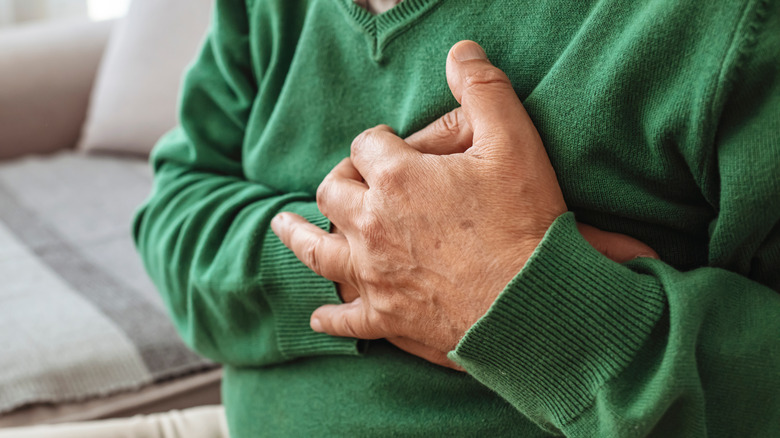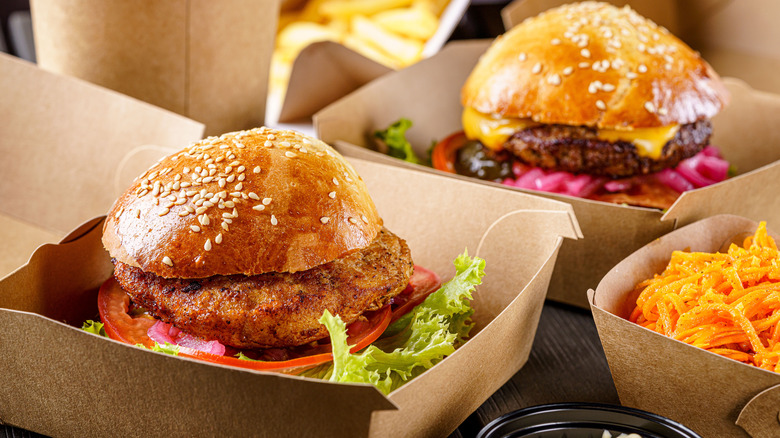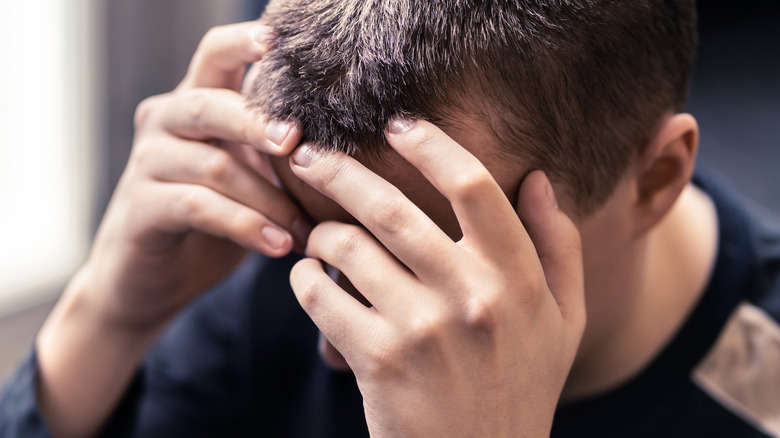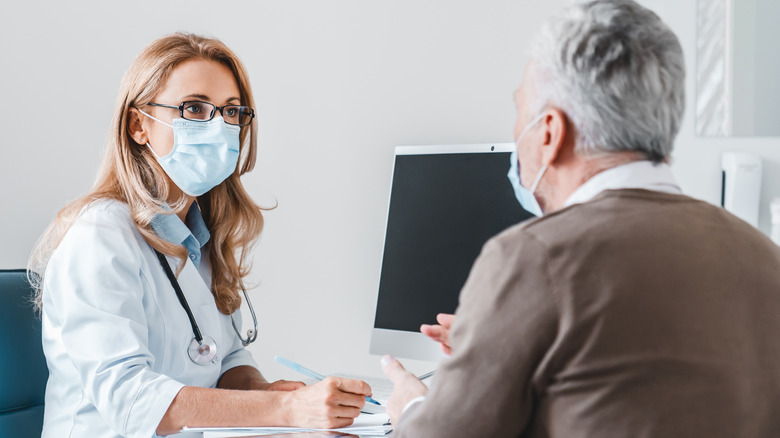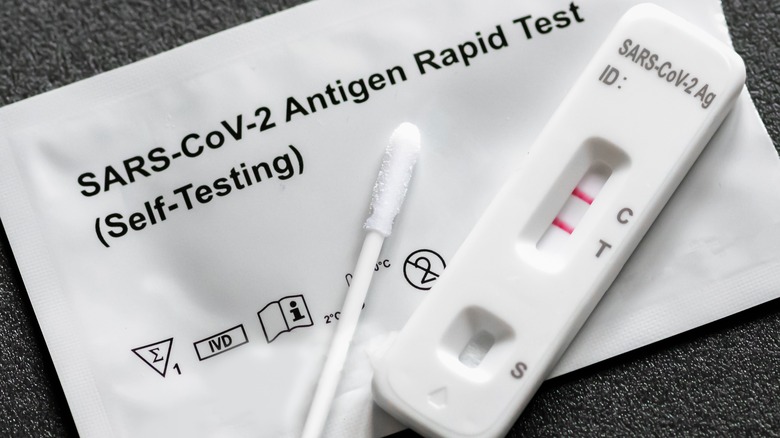Heartburn Explained: Causes, Symptoms, And Treatments
If you've ever experienced a burning sensation in your chest that gets worse right after you eat, you've most likely had heartburn. Pretty much anyone can occasionally experience heartburn, which isn't alarming. But when it becomes so common that it impairs your daily functions and quality of life, that's when things get serious — and intervention may be needed (via Mayo Clinic).
Heartburn can also be described as an irritation of the esophagus that's caused by stomach acid (via WebMd). According to Cleveland Clinic, heartburn is usually the main side effect of acid reflux, especially its most severe form also known as gastroesophageal reflux disease or GERD. So, even though your heartburn might not be intense, the root causes behind it might be more serious conditions that require medical care. If left untreated, these conditions can cause long-term health problems that might be harder to deal with once the symptoms exacerbate.
Even though it's called heartburn, it has nothing to do with heart disease. However, some symptoms might be similar to those of a heart attack (via Heart.org).
Heartburn symptoms and signs
According to the National Institute of Diabetes and Digestive and Kidney Diseases (NIDDK), the most common symptoms of heartburn include pain and a burning sensation in your chest, right behind your breastbone. This may be intensified in the evenings, after having a meal, when lying down or bending over. Heartburn may be a sign of an irritated esophagus due to acid reflux, GERD, or even pregnancy.
The burning pain is a result of the acidic contents of your stomach making their way up to the esophagus (via the Cleveland Clinic). This unpleasant sensation can last anywhere from a few minutes to a few hours, and may be felt in one specific place. Heartburn may also feel like it's climbing up from your chest through your esophagus to your throat. This can sometimes leave a bitter, hot, salty, or sour taste in your mouth, as well as a burning sensation in your throat. It may also cause difficulties with swallowing.
Causes of heartburn
Heartburn is described as an irritation of your esophagus, a tube that connects your stomach to your throat. The top and the bottom of the esophagus have valves called the esophageal sphincters (via Medical News Today). These valves are made out of bands of muscles that open and close the entry to the esophagus to let food and drink pass from your mouth to your stomach. In cases where this valve doesn't close properly due to inflammation or a health condition, some of the acidic mixture in your stomach travels back up through your esophagus to your throat, causing acid reflux — and with it, heartburn (per the Cleveland Clinic).
Causes of heartburn and acid reflux include GERD, hiatal hernia, pregnancy, and specific medications like anti-inflammatory drugs and aspirin. Additionally, heartburn can be caused by your diet and food choices, large portion sizes, and even eating right before you go to sleep.
Risk factors for heartburn
Even though occasional heartburn is normal and can occur after having eaten a large meal, spicy food, or too close to your bedtime, there are certain risk factors that can increase the possibility of developing this burning sensation more often, with more intense symptoms of acid reflux.
Obesity is one of the biggest risk factors for developing heartburn as well as GERD, with research pointing out how it's gotten significantly worse over the last 30 years (via a 2014 article in Gastroenterology Clinics of North America). Lifestyle choices such as smoking, alcohol, high stress levels, and even wearing tight-fitting clothes can increase the risk of experiencing heartburn and contribute to other medical conditions.
Some foods and drinks such as citrus fruit, onions, tomatoes, caffeinated and carbonated beverages, anf high-fat foods are known to potentially trigger heartburn for some people (via the Cleveland Clinic). This is especially true if they're already experiencing another inflammatory health condition.
Heartburn and pregnancy
Studies show that heartburn is one of the most commonly reported pregnancy symptoms, typically between 17%-45% of the time (via a 2015 study published in the BMJ). And even though complications are rare, there may be some linked to nausea and vomiting, which are common in most pregnancies. According to the Cleveland Clinic, the greatest reasons for developing heartburn during pregnancy are hormonal changes and body shape transformation that occurs as the belly grows and pushes organs around.
The hormonal changes, especially the rise in progesterone, are known to relax the lower esophageal sphincter and slow down your digestion, increasing the risk of stomach acid to travel back through the valve. Additionally, eating spicy, greasy, and fatty foods may worsen your symptoms, as your digestive system cannot break down food as efficiently and as quickly (via the University of Rochester Medical Center).
In addition to feeling a burning sensation in your chest, heartburn in pregnancy may worsen the feelings of bloating and nausea, as well as cause frequent burping and food to be brought back up to your throat (per the Cleveland Clinic).
Foods and drinks that can trigger heartburn
Some specific foods are known to trigger heartburn or potentially make it worse. Although it doesn't happen to everyone, it's still important to take this into consideration. If you want to avoid experiencing heartburn, steering clear of these foods and drinks might be a good place to start.
According to WebMD, foods known to trigger heartburn include all ultra processed fast-food items, citrus fruits and products, chocolate, peppermint, tomatoes and tomato-based products, onions, fried foods, garlic, black pepper, chili peppers and other spicy foods, as well as most fatty foods like cheese, bacon, sausage, and fat-laden portions of meat. Meanwhile, drinks known to trigger heartburn include carbonated beverages, caffeine and caffeinated beverages, and alcoholic drinks. It's worth noting that these foods can be an even bigger trigger if they're eaten in large portions or together with other inflammatory foods, or if they're consumed too close to your bedtime.
Acid reflux, heartburn, and anxiety
According to Medical News Today, there seems to be a link between anxiety and acid reflux. Stress is one of the known triggers for acid reflux, and it's also one of the natural causes (as well as side effects) of anxiety. Your body basically experiences stress and anxiety the same way (via the American Psychological Association), so there's a good chance they might trigger inflammation and acid reflux in the same way too.
A 2018 study published in the Journal of Neurogastroenterology and Motility suggests that people struggling with anxiety are more likely to experience GERD symptoms. They agreed on several potential reasons behind it: the possibility of anxiety reducing pressure in the lower esophageal sphincter, the muscle tension caused by anxiety and stress responses, and an increased pressure on the stomach, thereby causing increased acid production (and said acid being pushed back up through the esophagus).
How to diagnose heartburn
The pain and burning sensation in your chest which worsens after eating, lying down, or bending over is already a telling sign in itself, but it's important to know you're dealing with acid reflux or GERD so you can address it and fight it with the right treatment. The experts at the NIDDK state that a doctor will be able to diagnose your health condition after a careful examination of your symptoms, lifestyle habits, dietary habits, and medical history.
Your doctor may request several tests to further confirm your condition and rule out any other underlying, more serious disorders. One of the most common tests is the upper gastrointestinal (GI) endoscopy, which is used to see the state of your gastrointestinal tract from the inside out. Biopsy samples can also be examined by a pathologist to reveal more information about your condition.
Another commonly used test is esophageal pH monitoring, which can be done via a catheter or a capsule that measures your acid and non-acid reflux throughout the day and night.
When to see a doctor
Occasional heartburn isn't alarming, and in such cases, the pain usually goes away after a few minutes. But if it starts happening too often or the pain becomes more intense over time, it might be a good idea to take a trip to the doctor's office.
The experts at the Gastroenterology Consultants of San Antonio recommend seeing a doctor when your symptoms become too frequent and severe, in the event you're taking over-the-counter heartburn medications two or more times a week, or if you've already made lifestyle and dietary changes that are supposed to help relieve your burning symptoms but ultimately didn't work.
In any case, if you're feeling severe pain in your chest area or burning that's causing inability to function for hours after you've eaten, impairing your sleep, and affecting the overall quality of your life, it's best to get yourself checked, so you can get the right treatment immediately.
How to tell if it's heartburn or a heart attack
Sometimes, the pain in your chest may be too strong, causing you to fear that you might be experiencing a heart attack. Since it's all happening in your chest, these symptoms may be difficult to tell apart, especially as stress and anxiety kick in.
Even though there are ways to test whether it really is a heart attack or just heartburn, it's a smart move to call 911 or any emergency helpline. In case you're just experiencing heartburn, your symptoms will simply go away — but if you're suffering from a heart attack, you'll definitely need emergency medical help (via the Mayo Clinic).
Typical heart attack symptoms include pressure in your chest, shortness of breath, sweating, and pain felt down your left arm. Still, if you start panicking with pain and burning behind your breastbone, chances are you will experience all of the above mentioned heart attack symptoms, even if they're false alarms (via Heart.org).
Complications and refractory GERD
If left untreated, acid reflux, and more specifically GERD, can cause more severe complications down the line. WebMD lists a number of known complications such as inflammation and serious damage of the esophagus (esophagitis), esophageal ulcers, tooth decay, esophageal stricture or scarring of the lining of the esophagus, Barrett's esophagus (a condition where the stomach acid causes precancerous changes in cells), and an increased risk of esophagus cancer. The experts at Cheyenne Regional add other complications to the list, such as adult onset asthma, regurgitation of acid into the lungs, and sinusitis.
A special type of complication can occur due to the treatment of GERD. One of the most common treatments for GERD is proton pump inhibitor (PPI) therapy. Refractory GERD (rGERD) is a condition that occurs when the PPI therapy doesn't work and it causes similar, if not worse, symptoms afterward (via Frontiers in Medicine).
Treatment for heartburn
In order to treat heartburn, it's important to address acid reflux or GERD. The NIDDK lists a variety of different treatment options, starting with lifestyle changes that can significanlty reduce your symptoms and help reduce inflammation in your digestive tract. Some of these changes include losing weight and maintaining a healthy weight, abstaining from smoking and alcohol abuse, changing your eating habits and avoiding trigger foods, and keeping your head elevated during sleep.
Over-the-counter and prescription medications including antacids, H2 blockers, and proton pump inhibitors can lower the production of stomach acid and help relieve the severity of your symptoms. If your condition is more serious, surgery such as fundoplication — which involves sewing the top of your stomach around the end of the esophagus in order to tighten the lower esophageal sphincter and prevent acid reflux, per MedlinePlus – or bariatric surgery (usually gastric bypass) may be needed to fully address your condition.
Lifestyle changes
Sometimes, making simple lifestyle changes is enough to reduce your risk of heartburn or at least make your symptoms more bearable.
If you have a sensitive lower esophageal sphincter, it's important to stay upright or at least with your head elevated after your meals. This is even more important before bedtime or even while you sleep, as lying down is known to really worsen the burning sensation (via the International Foundation for Functional Gastrointestinal Disorders).
What you eat may be important, but how you eat matters as well. Try incorporating smaller, more frequent meals into your day instead of large portion sizes, and try to eat in a calm and stress-free environment. Other important lifestyle changes include quitting smoking, limiting caffeine and alcohol consumption, or losing weight and maintaining a healthy body mass index (BMI) year-round. Implementing these changes will drastically lower your inflammation and help reduce the pain and burning sensation you may experience after eating.
The GERD diet
The so-called GERD diet focuses on foods that can help prevent heartburn. The experts at Johns Hopkins Medicine agree on three specific categories of food which can do just that. The first category includes high fiber foods, such as whole grains like oatmeal, quinoa, or buckwheat, root vegetables like sweet potatoes, parsnip, and carrots, and green vegetables like broccoli, asparagus, and green beans.
The second category include alkaline foods such as bananas, cauliflower, melons, nuts, seeds, and fennel. As for the third category, these are foods with high water content such as watermelon, celery, cucumber, lettuce, chicken, beef, or vegetable broth-based soups, as well as different types of herbal tea.
Additionally, there are some home remedies that might help prevent heartburn and acid reflux by coating the lining of your esophagus and stomach before ingesting food. These include non-fat milk and low-fat yogurt, ginger, apple cider vinegar, and lemon water.
COVID and GERD
As the world continues to adapt to life with COVID-19, there is an increased interest in investigating how certain health conditions relate to the coronavirus, whether in terms of side effects or risk of infection.
The journal Human Molecular Genetics published an article examining how the risk of getting infected with COVID-19 may be linked to gastro-esophageal reflux disease. By looking at published genetic data for GERD and COVID-19 susceptibility, the researchers studied the genetic relationship between GERD and the risk of developing severe COVID-19, hospitalization, and overall risk of getting infected with COVID-19.
Per the results, there are certain risk factors that can increase the risk of developing both GERD and COVID-19. These risk factors mostly involve one's lifestyle, habits, and known diseases (such as obesity, smoking, being a type 2 diabetes patient, or having coronary artery disease). The researchers also noted that GERD susceptibility and the chances of getting hospitalized due to COVID-19 "were genetically correlated, with MR findings supporting a potential causal role between the two."

